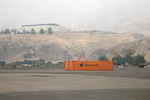
Chad Heimgartner (right) and his dad Lee Heimgartner farm about 4500 acres near Kendrick, Idaho. They're getting their combine ready to harvest chickpeas.
Conrad Wilson / OPB
The container yard at the Port of Lewiston, Idaho looks forgotten. A tall crane next to the Clearwater River sits parked and unused.
Off in the distance, two orange metal shipping containers lie side-by-side, floating in a sea of asphalt.
"We're looking across a fairly vacant container lot," said David Doeringsfeld, the port's general manager. "Last year, there would've been probably 250 containers here."
Lewiston is the farthest inland port on the West coast, meaning farmers from North Dakota, Montana, Idaho and eastern Washington all depend on it to get their goods to market. But some are having a difficult time getting certain crops to market.
For years, many used the container ship service at the Port of Portland to get their lentils and chickpeas to countries like China, India and Peru. But a long running labor dispute drove container ship carriers from Portland this spring.
With harvest nearly complete, those farmers are now paying the price.
The main crop around here is wheat. But farmers can't grow it all the time, because it would eventually suck all the nutrients from the field. So every few years, farmers rotate in peas and lentils to inject nitrogen back into the soil.
Doeringsfeld said that's where farmers are taking a hit, because the crops are shipped differently than wheat.
"Peas and lentils are all shipped in 100 pound sacks that are palletized, shrink wrapped, put in containers and sent out," he said. "So unlike wheat … peas and lentils are moved in containers."
Until recently, those containers were loaded onto barges at the Port of Lewiston. And from Lewiston they were sent down the Columbia River to Portland where they would get moved onto container ships.
But when the Port of Portland lost practically all of its container ship service, Doeringsfled said the ripple effect made it all the way to Idaho.
"When steamship lines quit calling that ended all container on barge service at the Port of Lewiston," he said.

The container yard at the Port of Lewiston, Idaho is virtually empty. Last year at this time there were 250 containers here, ready to carry farmer's crops down the Snake and Columbia Rivers to the Port of Portland and onto Asia and South America.
Conrad Wilson / OPB
Portland's two main carriers -- Hapag-Lloyd and Hanjin – left because of long loading and unloading times while in Port. The delays affected carrier's tight global shipping schedules.
The International Longshore and Warehouse Union has blamed the company that employs them – ICTSI Oregon. And the company has in turn, blamed the union.
Regardless of who's at fault, the effect has hurt thousands of farmers around the Inland Northwest.
"The Port of Portland was a very cost effective way to ship into the international markets," said Peter Klaiber, vice president of marketing for the USA Dry Pea and Lentil Council in Moscow, Idaho.
He said the barge system moved a lot of tonnage at a low price and provided easy access to ocean going ships. Now, he said, processors are shipping peas and lentils out of the Ports of Seattle and Tacoma, which are a little cheaper than Portland.
But the containers have to go north by truck.
"That increases the costs significantly," Klaiber said.
It cost about $850 to ship each container by barge. Those costs are now closer to $2,000 per container sent by truck.
"Because we are operating within a global market, we simply can't raise our prices to the buyers because they have alternatives: suppliers in China, or Australia, or Russia, or France or wherever," he said. "So where does that additional cost get recorded? It means that the return to the farmer has to be less."
This time of year harvest is well under way in the Palouse region along the Washington-Idaho border.
"We're at the bottom of the ladder as far as passing on expense," said Brian Silflow, while steering his green John Deere combine as it combs the golden rolling hills.
Silflow farms 2,800 acres with his dad outside Kendrick, Idaho. He's harvesting chickpeas, which Silflow acknowledges will make him less money this year than they did last year because of higher shipping costs.
"As producers it's a little tougher for us, because we don't have as much margin to work with," he said.
A few miles away, Chad Heimgartner is getting ready to take his combine out for the day.
Like most farmers around here, his crops are being trucked to Puget Sound.
He wants dockworkers and their company to work out the labor issues that led to the loss of container service in Portland.
"I don't think they have any idea what they're doing to us out here growing the crops," Heimgartner said. "They're just looking out for themselves. I think it's pretty selfish on their part and it leaves a pretty bitter taste in everybody's mouth out here."
Farmers agree the long term fix is for container service to one day return to the Port of Portland. But for now, these farmers will have to learn to adjust to smaller paychecks.




